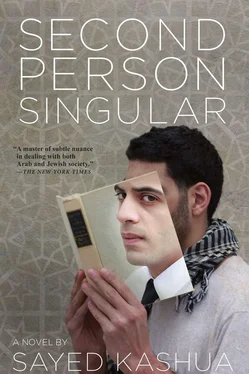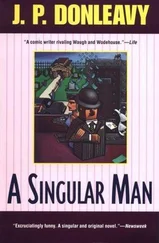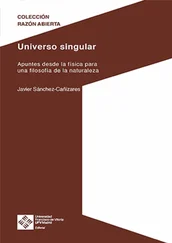The lawyer jumped off the futon and grabbed her arm. “Where are you going?”
“I can’t live like this.”
“What will you do?”
“If this is what you think of me, I’ll do whatever you want, okay? You want me to go back to my parents? You want to separate? Whatever you want. Whatever you say.”
“So,” the lawyer said, tightening his grip on her arm as she tried to wriggle free and leave, “you’re using this as an alibi to go and run off with him.”
“With who?” she yelled. “You maniac, with who?”
“Lower your voice, please.”
“No.”
“Are these the kinds of power games you play with him, too? Does he like these kinds of games?” The lawyer envisioned them together, his wife moaning with the kind of pleasure he had never inspired, and on top of her this man, smiling with the slyest of smiles.
“You’re crazy,” she cried, her body slumping, no longer straining to get free. “You think I even remember what he looks like?”
“You remember, you remember,” he said softly, as though speaking to a little girl. He took her hands and lowered them from her face. He smiled at her, while his hands held on to hers and lowered them to her waist and suddenly he wanted to hug her, but instead of hugging her he raised his right hand and, had he not heard Tarik come in, would have smacked her across the face, sending her flying onto the bed. That was the language she understood, just like in her Egyptian melodramas, he thought, breathing heavily, his chest rising and falling, the thumping bass of the previous night pounding in his ears.
TWO CARS
Samah was not surprised to hear the lawyer on the phone on a Saturday.
“Good morning,” she said over her squealing kids and the high-pitched sounds of the cartoons. Once every few weeks the lawyer would call her on a Saturday with a favor, asking that she look into something, so long as it wasn’t too much of an inconvenience, and she, so long as none of her boys were sick and she had not gone out on a family outing, always had time to do the lawyer a favor.
“I’m looking for someone,” he said, and his voice wavered when he realized that he was including her in a matter of grave importance. “All I know is that he’s an Arab-Israeli, around twenty-eight years old. I need to get ahold of him, put him on the stand. He’s a social worker. Here’s the telephone number of the head of social services in east Jerusalem. According to the information I have, he worked at their substance abuse outpatient clinic six or seven years ago and then just disappeared. I know this is not very specific information, but for now it’s all I have. All I need is his name, unless, of course, you can also find where he works. That’s it. Nothing else.”
He read Samah the number for the head of social services, whom he knew personally, and then said, “By the way, Samah, if they ask who it’s for, say it’s for a law firm but don’t say which one. Say it has to do with an inheritance and that we can’t find a current address, okay? Thank you, and I’m really sorry to bother you with this, it’s just that it’s urgent, and please send regards to your husband.”
The lawyer snapped open his desk drawer, looking for something that would help his headache, sure that he’d find some kind of aspirin. His head throbbed, but he had preferred to go to the office rather than the house. “I have some work that I need to take care of,” he had told his wife, even though she had not asked for an explanation.
He got up to make himself a glass of Turkish coffee in the kitchenette and drank some water, in little sips, so that it would be readily accepted by his body, not big gulps that could be shocking to the system, as he’d read online. He heaped two tall teaspoons of finely ground coffee into a glass, poured steaming water over them, and stirred. Although the lawyer had read online that coffee only exacerbated a hangover, he knew he needed to be alert, to take care of business and to avoid mistakes. Over the past two days, he’d certainly made his share.
“I don’t remember his name,” his wife had said about the guy to whom she’d written the note. This, of course, was a lie. She’d told him the whole story and the lawyer had felt that while she described this man whose name she supposedly didn’t remember, there was compassion, even love, in her voice.
The lawyer sipped the coffee, scalding his tongue, and sat down in his chair. Again he wondered about the appearance of the man with whom he had shared his wife. Because even if she had been telling the truth and the man was really just a colleague, a downtrodden kid who had never so much as touched her — even if all that was true, the lawyer knew that love had blossomed between them. What an idiot he had been. He never even considered the possibility that his wife might have loved someone else before him, and now he wasn’t even sure if she’d ever loved him at all.
“What’s the big deal about the note? What did I say — that I’d had a nice evening and that he should call? That’s it,” his wife had said, after they’d supposedly made up, a reconciliation that began as soon as Tarik returned to the apartment. The lawyer had come to his senses, apologized, and said he believed her, and she had apologized too, saying again that she had forgotten that she’d ever written that note. She said that the whole thing had happened many years before, while she interned at the outpatient clinic. She’d written the note to another social worker, perhaps the strangest person she’d ever met.
“He was like a kid. And everyone took advantage of him. He was totally helpless,” she said, and the lawyer had a hard time bottling up the rage that the description evoked.
So it wasn’t a tough guy, a skirt chaser, but a sensitive guy, the kind who may well have read all the books that the lawyer had acquired at the used bookstore. But why Yonatan ? the lawyer wondered. Why would an Arab sign the name Yonatan in all of his books?
“What was I supposed to think?” the lawyer had forced himself to say with a smile. He knew that temporary reconciliation was the only way to avoid defeat.
“Out of nowhere I find this letter, which I could tell you wrote, and I asked myself how is it possible that Leila, the person closest to me in the world, wrote this? I spent an entire day trying to find an explanation and when I couldn’t, I was hoping that you would give me one, but when you lied, I let the worst of my imagination run wild. As you can tell, I went out drinking, got terribly drunk, wanted to die. All because of a note you wrote a million years ago. Why didn’t you tell me?” he asked, and then without waiting for an answer he asked again, “Why didn’t you tell me?”
His wife laughed when he told her about the book. “Can you believe it?” he said and pulled out The Kreutzer Sonata. “Here I am putting the kids to bed, waiting for you to come home from your friend’s house, and I take out this book that I got at the used bookstore and the next thing I know I’m reading a love letter. At first I thought you had written it and put it in my book so I’d find it. But then. . I mean, how did you expect me to act? You should be happy all I did was throw your clothes out of the closet. I was thinking about burning them.”
His wife laughed, seemingly convinced. “I don’t believe it,” she said, turning the book over like someone examining a piece of evidence for the first time. “How did the note wind up in here?” and her question seemed genuine to the lawyer. “Well,” she said, “he was the strangest guy I ever met. He just disappeared one day. Everyone laughed at him, poor thing.” And that phrase, and the way she said it, only sharpened the sadness in the lawyer’s chest. “I guess you’ve always had a thing for strange people,” he said, giving her shoulders a squeeze.
Читать дальше












